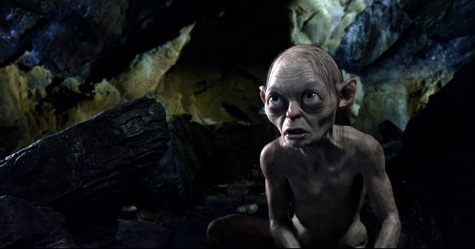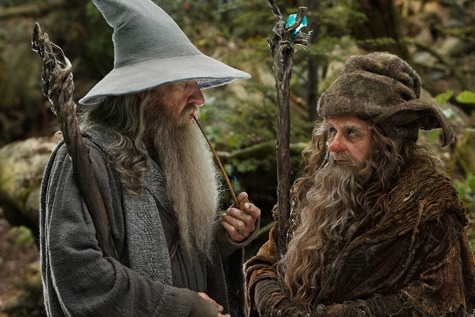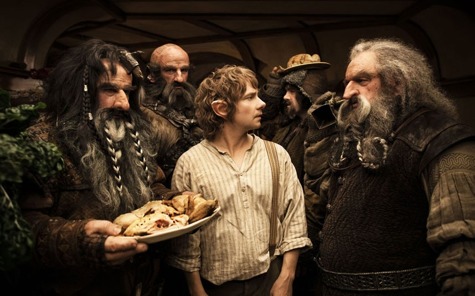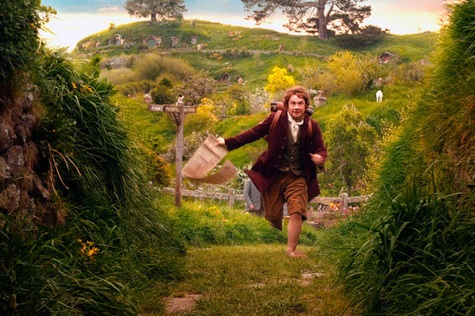It seems that ever since Peter Jackson announced that he was going to split The Hobbit into three movies, people have done nothing but predict disaster of epic proportions. Some immediately heralded the dawn of a new George Lucas, while others who had never been pleased with his interpretation of the initial Lord of the Rings trilogy triumphantly crowed, “I told you so!” to anyone within shouting distance.
So I’m awfully pleased to say it—The Hobbit: An Unexpected Journey is lovely. Please just go and enjoy it.
(Minor spoilers for the film.)
I should start this review by informing the super-fans; I love Tolkien’s books. They are very dear to my heart, and have been for some time. But I am not at all pedantic about how they are adapted, and minus a few quibbles, I adored Peter Jackson’s Lord of the Rings trilogy. So when people shout at me about the finer pronunciation of Sindarin, or the bits in the appendices that were altered and butchered, or rage about Gimli’s function as comic relief, I begin to tune them out. Like I said, I have my own personal irritants, but as film adaptations go, Jackson did something unimaginable to most minds and pulled it off. Give the credit where it’s due.
That said, there is something that I feel needs to be clarified about these films; when you step into the theater, you are not signing up to watch Lord of the Rings the Book Movies. It has been quite clear since 2001 that when you sit down with your popcorn, you are watching Peter Jackson’s Middle-earth. If that’s not for you, that’s completely fine. You can read the books again, or watch the animated versions, and everyone can get what they want and be happy.

It makes sense for Peter Jackson to want to fill out his canvas. Film can show certain things that prose cannot (and vice versa, obviously). But more importantly, when Tolkien wrote The Hobbit, he had no idea how far he would continue to expand upon this world. Not only is the first book very clearly aimed at children, but there are all sorts of gaps that need filling when you hop between it and Rings proper. If Jackson had simply taken The Hobbit’s text at face value, we would have wound up with one short film that was at complete odds tonally with the other three films he had created. So Jackson pulled from extra material that Tolkien left us and knitted it together. He grounded Bilbo’s story in context. We won’t know the full picture until we see all three films, but so far, it’s hitting some impressive marks.
And if you like Peter Jackson’s Middle-earth, this movie is sure to delight.
I’ll start with the bad; the pacing in the first third of the film is jumpy at best. Though we nicely get to spend lots of time watching dwarves tear apart Bilbo’s pantry, the introduction to extra story and plot elements don’t blend seamlessly into the narrative, and it causes strange cuts to characters we don’t know, or weird asides where they don’t seem to belong. This isn’t quite so surprising because the framing device of the whole tale (of Old Bilbo recording the story for Frodo’s posterity), while charming, is not anywhere as neat as Galadriel’s Fellowship of the Ring voiceover. Once we get over these hiccups, things are pretty smooth from there on in, with a few exceptions.
Speaking of Fellowship, this movie very clearly mirrors elements of that first film with some incredibly effective results. It follows a similar plot structure, of course, and there are certain shots that drive the point home. In fact, Jackson is entirely aware that he has built up this visual vernacular for his audience, and knows just how to use it. Gandalf’s silhouette is employed at several impacting points, the intrepid band treks across mountains as we look on from above, and watch the first time the ring slips onto Bilbo’s finger—it is a beautiful matching moment to the first time it slips onto Frodo’s finger in The Prancing Pony.
For those who are worried that the humor inherent in The Hobbit was abandoned altogether, there’s no reason to fear. A few of the sillier parts have been toned down, but the overall lightness of the story remains. While some have complained at the abundance of action sequences, these scenes all have a sense of whimsy about them that Lord of the Rings never possessed. They are fun to watch, fun to root for, and aiming to make you smile.

The additions from various areas of the text are at times staggering in their poignance. The first appearance of the Necromancer is chilling, and the White Council scenes are perfectly integrated and powerful. Radagast the Brown is not, as some have implied, the newest Jar Jar Binks—his first few minutes on screen are perhaps puzzling, awkwardly earnest, but he quickly becomes relevant to the plot and is very interesting to view opposite Gandalf.
Richard Armitage plays Thorin Oakenshield with a poise and ferocity that the character has always deserved, and his band of dwarves are a treat to watch. Ian McKellen and Andy Serkis return to their roles as Gandalf and Gollum respectively, and seem to have somehow impossibly gotten even better in their portrayals as the years have passed. It is particularly interesting to see how they chose to interpret younger versions of their characters. (The same is true for Saruman, Galadriel, and Elrond—look at Hugo Weaving smile in this movie.) Gandalf seems a bit smaller in scale, still learning, but that glint in his eye remains along with his knack for impeccable retorts. I won’t say anything more about Serkis because you really just need to see Gollum to believe him.

But the movie belongs to Martin Freeman, who has imbued Bilbo Baggins with all the appropriate fidgeting, nervous stammering, and pure heart that we could wish for. To say that he was born for a role like this is an annoying cliché, so instead I’ll say that no one could have pulled the part off with half his level of honesty (to say nothing of comic timing). Far from letting Bilbo become a parody of himself, Freeman has given the hobbit a moral complexity that is truly gorgeous to behold. He will likely make you cry, so be prepared.
So that’s a no to outright perfection, I suppose, but The Hobbit is still a win in my book. Do yourself a favor sometime soon and go see it. Don’t reread the book right beforehand because the story will be immovable in your mind. Just have fun, sing along. Prepare your pantry and have an unexpected party—it’s the perfect way to close out the year.
Emmet Asher-Perrin was so happy to see bitty Frodo again. She welcomes dwarves to anything in her pantry besides the spicy pickles. You can bug her on Twitter and read more of her work here and elsewhere.










